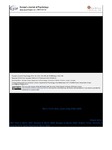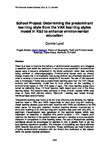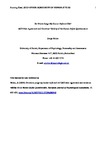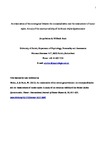The German version of the Humor Styles Questionnaire: Psychometric properties and overlap with other styles of humor
| dc.contributor.author | Ruch, W | |
| dc.contributor.author | Heintz, S | |
| dc.date.accessioned | 2020-03-16T13:02:29Z | |
| dc.date.available | 2020-03-16T13:02:29Z | |
| dc.date.issued | 2016 | |
| dc.identifier.issn | 1841-0413 | |
| dc.identifier.issn | 1841-0413 | |
| dc.identifier.uri | http://hdl.handle.net/10026.1/15461 | |
| dc.description.abstract |
The Humor Styles Questionnaire (HSQ; Martin et al., 2003) is one of the most frequently used questionnaires in humor research and has been adapted to several languages. The HSQ measures four humor styles (affiliative, self-enhancing, aggressive, and self-defeating), which should be adaptive or potentially maladaptive to psychosocial well-being. The present study analyzes the internal consistency, factorial validity, and factorial invariance of the HSQ on the basis of several German-speaking samples combined (total N = 1,101). Separate analyses were conducted for gender (male/female), age groups (16–24, 25–35, >36 years old), and countries (Germany/Switzerland). Internal consistencies were good for the overall sample and the demographic subgroups (.80–.89), with lower values obtained for the aggressive scale (.66–.73). Principal components and confirmatory factor analyses mostly supported the four-factor structure of the HSQ. Weak factorial invariance was found across gender and age groups, while strong factorial invariance was supported across countries. Two subsamples also provided self-ratings on ten styles of humorous conduct (n = 344) and of eight comic styles (n = 285). The four HSQ scales showed small to large correlations to the styles of humorous conduct (-.54 to .65) and small to medium correlations to the comic styles (-.27 to .42). The HSQ shared on average 27.5–35.0% of the variance with the styles of humorous conduct and 13.0–15.0% of the variance with the comic styles. Thus–despite similar labels–these styles of humorous conduct and comic styles differed from the HSQ humor styles. | |
| dc.format.extent | 434-455 | |
| dc.format.medium | Electronic-eCollection | |
| dc.language | eng | |
| dc.language.iso | en | |
| dc.publisher | Leibniz-Institute for Psychology Information (ZPID) | |
| dc.subject | Humor Styles Questionnaire (HSQ) | |
| dc.subject | German adaptation | |
| dc.subject | reliability | |
| dc.subject | factorial validity | |
| dc.subject | factorial invariance | |
| dc.subject | styles of humorous conduct | |
| dc.subject | comic styles | |
| dc.title | The German version of the Humor Styles Questionnaire: Psychometric properties and overlap with other styles of humor | |
| dc.type | journal-article | |
| dc.type | Article | |
| plymouth.author-url | https://www.ncbi.nlm.nih.gov/pubmed/27547259 | |
| plymouth.issue | 3 | |
| plymouth.volume | 12 | |
| plymouth.publication-status | Published online | |
| plymouth.journal | Europe’s Journal of Psychology | |
| dc.identifier.doi | 10.5964/ejop.v12i3.1116 | |
| plymouth.organisational-group | /Plymouth | |
| plymouth.organisational-group | /Plymouth/Faculty of Health | |
| plymouth.organisational-group | /Plymouth/Faculty of Health/School of Psychology | |
| plymouth.organisational-group | /Plymouth/REF 2021 Researchers by UoA | |
| plymouth.organisational-group | /Plymouth/REF 2021 Researchers by UoA/UoA04 Psychology, Psychiatry and Neuroscience | |
| plymouth.organisational-group | /Plymouth/REF 2021 Researchers by UoA/UoA04 Psychology, Psychiatry and Neuroscience/UoA04 Psychology, Psychiatry and Neuroscience MANUAL | |
| plymouth.organisational-group | /Plymouth/Research Groups | |
| plymouth.organisational-group | /Plymouth/Research Groups/Plymouth Institute of Health and Care Research (PIHR) | |
| plymouth.organisational-group | /Plymouth/Users by role | |
| plymouth.organisational-group | /Plymouth/Users by role/Academics | |
| dc.publisher.place | Germany | |
| dcterms.dateAccepted | 2016-04-12 | |
| dc.identifier.eissn | 1841-0413 | |
| dc.rights.embargoperiod | Not known | |
| rioxxterms.versionofrecord | 10.5964/ejop.v12i3.1116 | |
| rioxxterms.licenseref.uri | http://www.rioxx.net/licenses/all-rights-reserved | |
| rioxxterms.type | Journal Article/Review |





